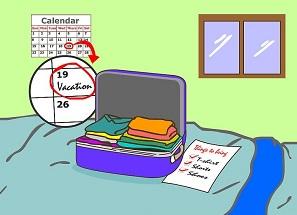ADAA Mental Health Blogs for the Public
Many of my patients took an extended holiday over the Christmas/New Year's break. When they returned to treatment in midJanuary most of them reported that their OCD symptoms had worsened. Obsessions returned that had been dormant. New obsessions and compulsions emerged and sometimes they didn’t realize this was OCD because the content of the OCD was unfamiliar. Compulsions they had been successful resisting in the past were much harder to resist. If you have OCD, it’s helpful to understand what may happen when you go on vacation.
We are in the home stretch of a prolonged, caustic, and shocking presidential campaign season. No matter which way you lean, few will argue that the 2016 election will go down in history as unprecedented, in that both candidates seem have a surplus of skeletons in their closets and a penchant for throwing surprise curveballs.
1. Latch on to triggers that set you off.
Figure out what frightens you and examine how your anxiety reaction is triggered. Your goal is to identify your particular triggers, so you can manage your fear when anxiety levels are low. Learning what sets you off makes it easier to turn it off.
The fear of vomiting can become so all-consuming and terrifying that eating becomes a struggle and weight loss becomes dangerous. As sufferers try to protect themselves from throwing up, their world shrinks until it becomes impossible to work, go to school, or to socialize. This was Kay prior to treatment. In this live free webinar, Ken Goodman, author of The Emetophobia Manual, interviews Kay, one of his former patients. Together they discuss her remarkable healing journey and how she freed herself from the fear of vomit and reclaimed her life.
More than 40 million adults in the United States suffer from some form of anxiety. Sadly, only one-third recognize what may be happening and talk to their doctor; only about one-quarter of African Americans seek mental health care, compared to 40 percent of whites.
College is typically a challenging experience with some expected highs and lows. For some it is also the time during which common mental health problems start. Because of this, you have to talk to your kid about mental health before school starts.
This conversation must include these topics:















